Here’s what you do:
1. You login to Facebook or Instagram
2. You mindlessly scroll through your feed
3. You repeat this behaviour several times a day
It seems harmless, right? You’re just checking social media. But every time you go on social media, you run the risk of entering the Compare and Despair Cycle. You can fall into the comparison trap.
Humans have been playing this comparison game for thousands of years. It’s nothing new. But thanks to modern technology (i.e. social media and television), it’s now so much easier for you to make comparisons that are harmful to your wellbeing.
When you watch commercial television, what sort of lifestyles do you see?
You’re not exactly seeing the Kardashians struggling to put food on the table. Most shows on commercial television present the lives of the middle to upper-class.
Now think about social media …
What sort of things are your friends posting?
Generally, it’s the most exciting parts of their lives. The best bits of their lives. So what you’re seeing is a highly curated feed.
Is it a solid platform to base comparisons on?
Any comparison you make on these platforms is likely to be way off the mark. It’s not going to be grounded in reality.
So what’s the solution? Do we just stop comparing?
That’s like saying ‘Stop breathing’!
What you need to understand is that it’s human nature to compare. We’ve learnt to play the comparison game from a very young age. So it isn’t that easy to just give up the game.
You can train yourself to compare less and to compare in ways that boost your wellbeing.
The less time you spend on social media, the less exposure you have to all those highly curated images that make you feel like a loser. If you restrict your access to social media, you’re going to dramatically reduce your comparison count. It’s as simple as that.
But you and I both know that staying off social media isn’t that simple. Social media is like junk food. It’s addictive. Once you start consuming it, it can be really hard to stop.
As Emma Markezic states in her book Curveballs:
“… it probably won’t be easy at first. You might discover you have real withdrawal symptoms and find yourself wondering what to do with your hands.”
But trust me, within a few days, you’ll readjust. You’ll start to feel less jittery. In fact, you’ll most likely feel a tremendous sense of calm wash over your brain.
If you refuse to cut back on social media, then you must perform reality checks on what you see online.
Because here’s what a lot of us don’t understand…
It’s in our biology to trust what we see with our eyes. This makes living in a highly curated Facebook/Instagram world a little bit dangerous.
Here are some questions I use to perform reality checks:
Because maybe it doesn’t. Maybe the image has been photoshopped or has had a filter applied to it.
Super model Cindy Crawford has famously said, “I wish I looked like Cindy Crawford”. Pictures of Cindy are airbrushed and tweaked to the point where she no longer recognises herself.
If they are posting a lot about their life, it’s an indication that they’re not fully enjoying the present moment. Perhaps something is missing from their life?
Psychologist Nancy Colier states in her book The Power of Off: The Mindful Way to Stay Sane in a Virtual World:
“We are spending far more time than ever before reporting on ourselves, who we are, where we’ve been, and what we’re doing, but that also means we are spending far less time actually being with ourselves, inside our own attention, inquiring, and investigating our own experience.”
Many social media influencers feeds are not true representations of their lives. Many of these influencers are paid to glamorise their lives and promote particular products.
So remember this …
If someone’s existence looks too good to be true, then it probably is.
Just like many social media posts, online ads are also highly curated. But what makes them even more dangerous than your average social media post is that they usually have a damaging underlying message, that message being:
But you’ll see the ad offers a simple solution:
“Buy this product and you can be happy and beautiful like the people featured in the ad!”
Sadly, 99% of the time, this is a lie.
According to research, these things make a difference:
• Feeling connected to other people
• A good night’s sleep
• Physical movement
• A healthy diet
• Learning new skills
• Being interested in the world around you.
New shiny things won’t cut it!
It’s for this reason, I’ve limited my exposure to ads by:
• Installing an adblocker plugin on my laptop to stop online ads
• Getting rid of my television
• Not reading women’s magazines (research shows these make girls/women depressed)
Despite my best efforts, I can’t avoid all ads (hey, they’re everywhere!). So here’s how I deal with ads on buses, radio and the back of public toilets doors:
For example, I was riding my bike home the other day when I saw an ad on a bus stop promoting some greasy fast food. Without even thinking, I blurted out, “Type II diabetes? No thanks!”.
It sounds crazy, but this is a brilliant strategy to protect your psyche from the harmful effects of advertising. Try it out and see for yourself.
How do you define success? By having lots of money? Lots of stuff?
Put your creativity cap on and think again!
There are many other ways you can measure success.
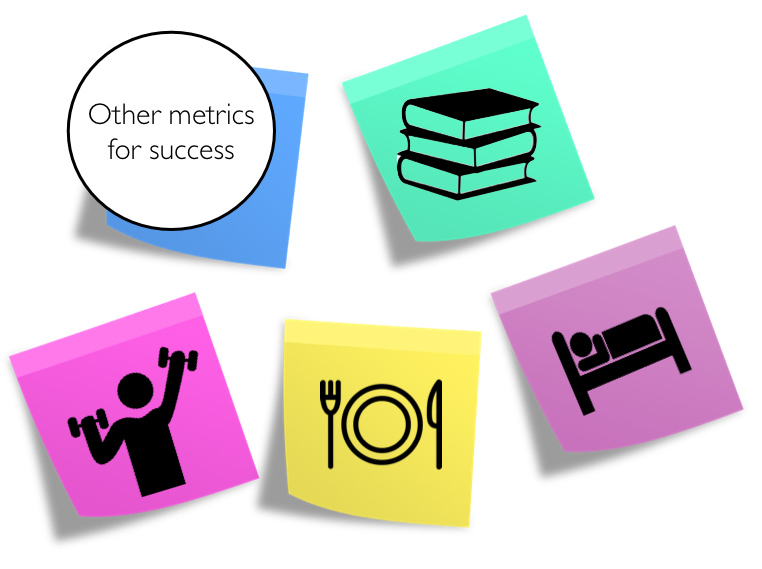
Here are some of my metrics for success:
• The number of books I read each month
• The number of healthy home cooked meals I make each week
• The number hours of sleep I get each night
• The number of times I go to the gym each week
I challenge you to come up with your own metrics.
If you’re going to compare, start comparing yourself to yesterday or last week’s version of you.
Ask yourself:
“Compared to yesterday am I a little bit smarter? Stronger? Wiser?”
Professor Joshua Smyth from Pennsylvania State University recommends saying to yourself:
“I don’t have everything in my life done yet. But I’m a little bit better today than I was last week. I’ve made some progress. I’m working towards my goals and I’m feeling better about it.”
If someone looks like they’ve achieved success in a particular area, instead of feeling jealous, ask yourself:
1. What can I learn from this person?
2. What skills or behaviours have allowed them to do so well?
Perhaps it looks like the person is an overnight success but upon closer inspection, they’ve been plugging away at their craft for years!
Find out the person’s secrets and see if you can emulate what they do.
What do you actually need to live a good life (i.e. to be happy and well)?
Go back to basics. For example, here’s what I know I need to live well:
• My morning smoothie
• At least one hour of physical movement each day
• 8 hours of sleep every night
• At least 30 minutes to read, relax and explore ideas
• Time with my family and friends
• Projects that stimulate my mind and expand my world
• Healthy, plant-based meals
I find that I’m happiest when I focus my time, energy and attention on getting these core needs met.
The simplest way to lift your mood and boost your confidence is to limit your comparison count and start comparing in better and more constructive ways (e.g. What can I learn from this person?)
Instead of looking at highly curated images, listen to interesting podcasts, TED talks, etc. Make an effort to absorb amazing ideas and images.
Remember, it’s in our biology to trust what we see with our eyes. Whatever you put into your brain shapes your entire worldview. So what will your inputs be today?
Share This:

When my competitive instincts kick in, I feel like a desperado. It’s an old feeling from childhood where I feel like I’m constantly falling short (not good enough or smart enough).
Over the past few years, I’ve trained myself to focus on running my own race. I’ve had to learn to do things my way. As it turns out, when you live this way you feel better about yourself and less anxious too.
When I was 17 years old, I was struggling to figure out what I wanted to do with my life (“Should I be at Law school? Should I quit and get a job?”).
To keep depression at bay, I forced myself to exercise in the park every Sunday.
That’s where I met a wise woman who happened to be a family lawyer.
Over the course of a year, we became friends exercising in the park. I confided in her that I was struggling at university.
“I’m not sure if Law school is the place for me”, I said.
I also mentioned to her that I had failed my first test but I stopped short of telling her my mark (only 5%).
It must have been obvious that I was in need of a bit of a confidence boost because the following Sunday she rocked up to the park with an old record in her hand.

The track was called I’ve gotta be me.
She said “This is for you. Listen to it when you get a chance”.
Back in those days, there was no Spotify or music streaming services. In order to listen to this record, I had to go to Cash Converters (a secondhand pawn shop) and purchase a clunky stereo system with a record player.
I listened to the song hoping to have some earth shattering realisation about what to do with my life. And when it never came, I listened to it again and again. Still nothing.
“What is she trying to say to me with this song?” I cried.

Looking back, it’s so obvious what she was trying to say (“Be yourself! Follow your dreams! Don’t give up!”).
The problem was I was treating listening to this song like it was an assignment to analyse a poem or a piece of abstract art. I was overthinking it.
Looking back, it didn’t matter that I didn’t fully understand the lyrics. I was really touched by this lawyer’s kind gesture.
Law school felt like such a cold and competitive place at times. Coming from a working class family, it was easy to feel like you were invisible and didn’t belong there.
Yet here was this woman (a successful family lawyer) encouraging me to be myself and keep going. That meant a lot to me.
Two decades later as I listen to the track, I get it.
It’s powerful to live life on your own terms.
What they don’t teach you in school is it’s far more rewarding to collaborate and cooperate and forge your own path forward in life than it is to compete against others and follow the herd.
It’s also a lot more fun and energising to run your own race and focus on your own progress.
It’s possible to run your own race, even if you have shaky confidence. In fact, running your own race will help you to build rock solid confidence. So the sooner you learn to do this, the better.
Here’s how you do it . . .
Instead of competing and comparing yourself against your friends or some other poor soul in your class or workplace, start competing against yourself. Compare you to you.

A simple habit you can develop is tracking your wins each day in a notebook. I do this just before going to bed (my notebook is on my bedside table).
This simple practice helps build momentum. As Dr Benjamin Hardy says “[When you cultivate this habit] you feel like you’re always winning and making progress.”
If you write down three wins every day, by the end of the week you’ll have 21 wins down on paper. If you keep this practice up and look back over your entries, something shifts. Instead of feeling like a desperado, you’ll be feeling like a champion.
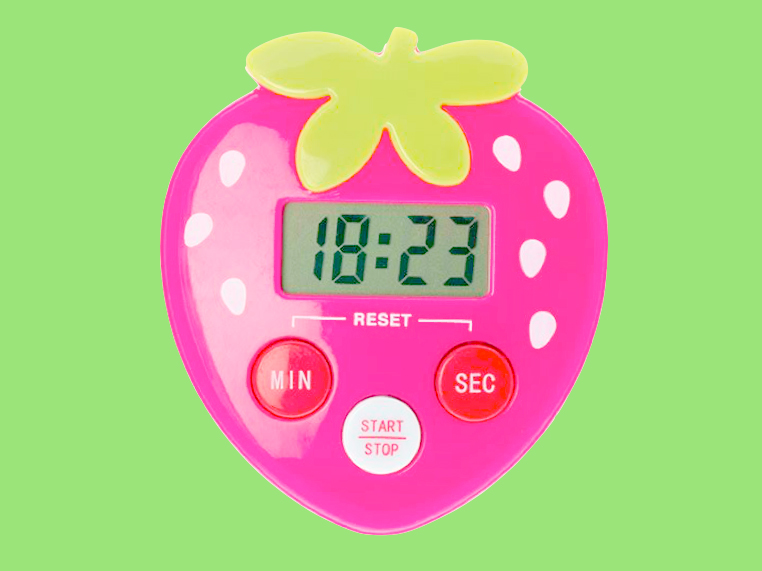
If you must have some opponent to compete against, make your opponent an electronic timer. Challenge yourself to compete against the timer.
“Can I empty this laundry basket (putting away my clothes) in under 5 minutes?”
“Can I vacuum the house in under 12 minutes?”
“How many words can I get down on the page in 25 minutes? Let’s go!”
When I’m lacking motivation, this is one way I get moving with various tasks. Timers can also help you stay focused on a task for a period of time and time your rest breaks.

Another way you can challenge yourself is with music. You can create a 25 minute or hour long playlist and use it to time your work sessions. If it’s a small task you need to complete (under 5 minutes), use an upbeat song to help you get it done.
In The Ultimate Time Management Toolkit Risa Williams recommends selecting songs with no lyrics and that don’t have any sad emotions associated with them. When it comes to your schoolwork, try to keep the music light and upbeat without being overly distracting.
The biggest mistake people can make when it comes to achieving their goals and creating new habits is to push themselves too hard.
I’ve been sitting at this computer for over an hour and I’ve ignored the last two timers that have gone off. Why? Because I’m in a flow state. When I started writing this blog, it was slow and painful. But now the ideas are flowing and I’m into it.
But I know I need to stop soon. If I don’t, I’m going to fry my brain.
As Greg McKeown says:
“You’re trying make sure that you don’t use up more mental energy than you can recuperate each day and each week. You want to be able to sustain the pace and get the job done. This is in contrast to being intermittent in your effort when you go big for a couple of days and then you can’t even work on it after that because you fried your brain, and you can’t get back to it.”
In a nutshell, think of this race you’re running as being a marathon (not a 100 metre sprint). Pace yourself.
Spending too much time on social media or following the wrong people online is the equivalent of pulling a hamstring when you’re out running your own race. It will mess with your mind and take you off course.
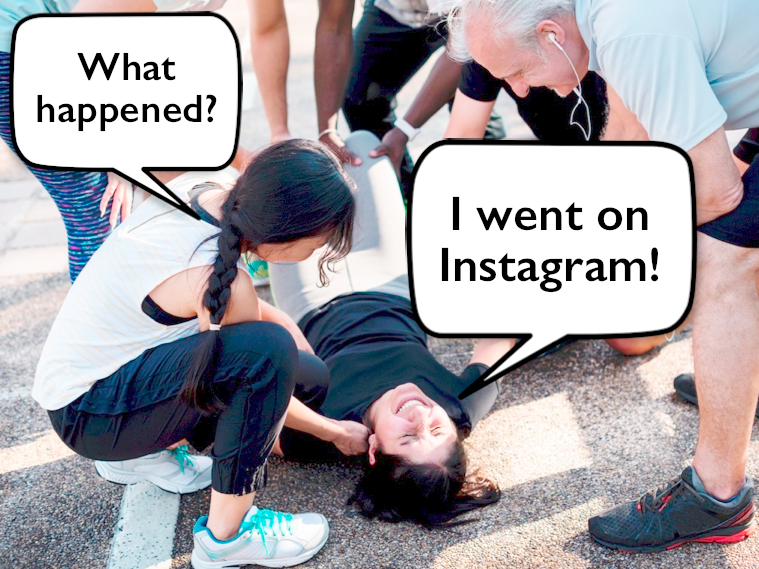
One of the problems with social media is it is designed to have you engage in upward comparisons. It puts you in a state of mind where you are constantly seeking approval from others.
Instead of focusing on what you need to do to move forward with your goals, you’re wasting time and energy following what others are doing. You get pulled into the outrage machine. Very quickly you can lose sight of your goals.
When you spend too much time on social media, your perception of reality also gets warped. Being exposed to envy inducing perfect pictures and posting only the best parts of our lives can make us forget that life is indeed very messy! In the book Disconnect Jordan Guiao explains:
“It is travel without the sixteen-hour flight, the fit body without the six-days a week workout regime and birthday parties without the crying babies. These approximations of reality start to become our new normal. As we edit out the messiness and ugliness of real life, we begin to forget that this messiness and ugliness exists for others too.”
Guiao recommends asking yourself whether the people you are following add value to your life. He says:
“Periodically reassess who you follow on social media and why. Is an influencer offering valuable advice and insights or just posting pretty pictures that make you feel bad about yourself? Do you think about their content when you’re offline? Does it serve you to comment on others’ posts if you are only doing it to seek their approval? What are you gaining from these interactions – and what are you losing?”
When you decide to ditch the pretty pictures and unfollow the influencers, you’ll notice a dramatic shift in how you feel about yourself and how you’re tracking in life.
If you’re like me, competing against others will leave you feeling desperate, insecure, and chaotic. So, why not start playing your own game?
Stay true to yourself. Do it your way. Set your own rules and path.
Using a timer or a song can be a simple way to get moving with a task. Reducing time spent on social media will help you to stay focused on what you truly want without getting distracted by all the noise and drama that’s playing out online.
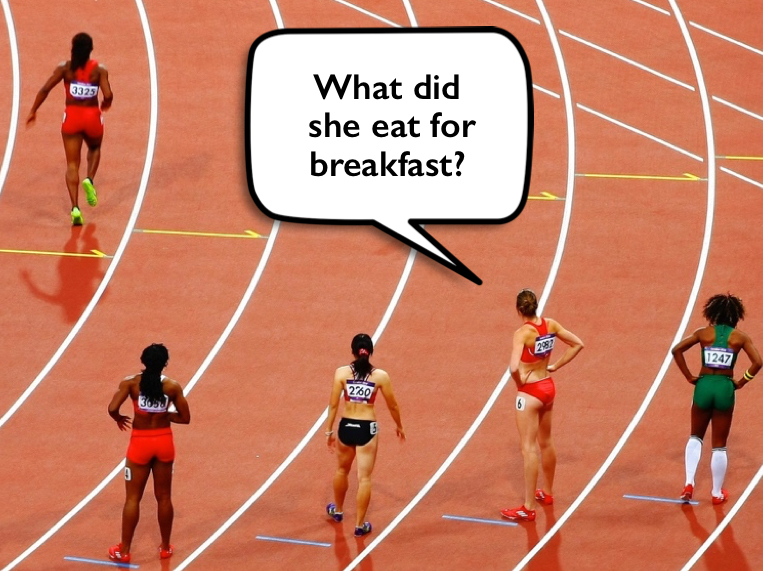
This means you need to prepare yourself mentally and physically for them.
You can work so hard to memorise large quantities of information for an exam, but if you’re not mentally and physically prepared, all that hard work can sadly go to waste.
When it comes time to take your exams, you have to relate to yourself as a professional athlete. Leading up to the day of the big performance (i.e. the exam), you need to eat nutritious food, be in the right frame of mind, manage your nerves, and allow your body to rest. These simple things can make all the difference to your exam performance.
You may be thinking “But isn’t this just common sense?”
It is! But creating healthy habits takes time and practice.
It’s one thing to intellectually know you should be eating well but it’s another thing altogether to incorporate healthy meals and snacks into your lifestyle.
I see a lot of students drinking energy drinks, getting very little sleep, and eating highly processed foods in the days leading up to exams. I have to admit, there was a time when I engaged in these behaviours too. I can tell you from personal experience, this is a recipe for mediocre grades and a miserable existence.
Here are my top 10 tips to prevent burnout and boost exam performance:
Sleep is critical to the learning process, exam performance, and wellbeing. Yet it’s usually the first thing students sacrifice to get more study done.
If you miss two hours of sleep each night for a week, the cognitive effects are as bad as going without sleep for two days straight!
Studies have also found that if you stay awake for 18 hours straight that’s like having a blood alcohol level of 0.05. In other words, it’s like being legally drunk. Your ability to focus, think, and learn will be seriously impaired.
You can’t adapt to getting less sleep. As adolescents, you need about 9-10 hours of sleep per night to be as alert as possible when you wake up.
If that feels unachievable, try to just get an extra 15 minutes of sleep tonight. Gradually increase this each night until you reach your target.
Often students stop exercising when they start preparing for exams. They think “I don’t have time to exercise!”. It’s as if they think they must spend every moment studying. Don’t fall into this trap.
Movement is your friend when it comes to studying for exams.
Research shows engaging in regular physical movement will help you to study more effectively. Firstly, it’s a great way to relieve stress and release feel good chemicals. Secondly, it gets the blood flowing more efficiently to your brain, which can give you a cognitive boost.
One study found students who engaged in 5 minute movement breaks every 17 minutes during a lecture retained more information and could focus better.
Every time you engage in a short movement break, you’re enhancing your study sessions.
Research has found that students who skip breakfast experience a decrease in cognitive performance and alertness compared to students who eat breakfast.
Eating a nutritious breakfast will give you a cognitive boost before an exam. It will also help you to feel fuller for longer, stabilise your mood, and give you plenty of energy to get through the exam.
Here are some healthy breakfast ideas:
Muesli or porridge with nuts and fresh fruit (e.g., berries) Wholemeal toast with a variety of toppings (e.g., baked beans, tomatoes, and avocado) and a piece of fruit A healthy homemade smoothie (click here for my brain boosting smoothie recipe)
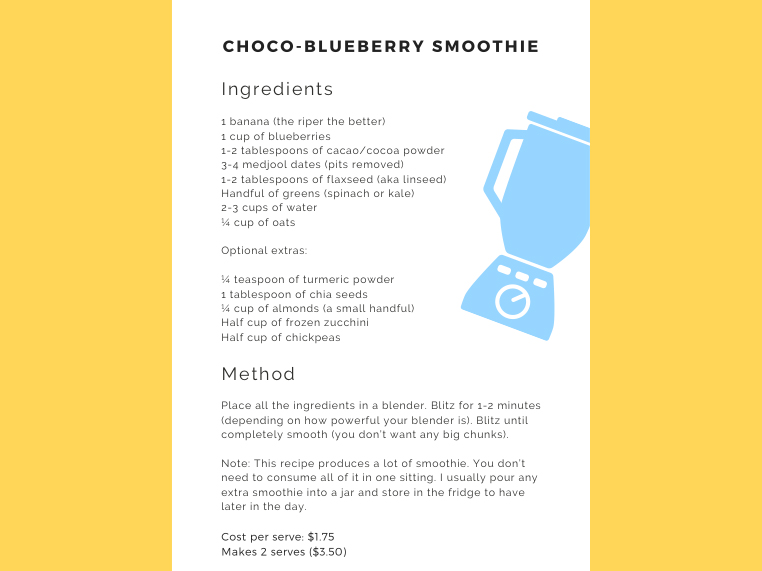
Your brain requires adequate hydration to function properly. Drinking water ensures that your brain receives the necessary fluids to perform tasks efficiently, such as retaining information and problem-solving.
Take regular sips of water as you study. It’s a good idea to have a glass of water or a reusable drink bottle within arms reach.
You may even want to create a tiny habit to remind yourself to engage in this simple behaviour (e.g., “After I finish answering a practice exam question, I will take a sip of water”).
Many years ago, I started thinking that my teachers and lecturers were out to get me. I thought they would mark me down wherever they got the chance. As a result of this distorted thinking, I became too scared to write anything in one of my first tests at law school. After receiving a terrible grade (5%), my brother said to me:
“Remember sis, your teachers want you to do well. They will try to give you marks wherever they can. It’s in their best interest to do so.”
Don’t worry about writing a perfect answer. If you’re unsure, be brave and still write something down. Even if it’s just a few dot points, it’s better than nothing. You may not get any marks for it, but your teachers won’t take marks off.
Just remember, most of the time your teachers are on your side and they want you to succeed. When you do well, it makes them look good.
Chances are there will always be something that you could have studied more thoroughly come the day of your exam. But on the morning of an exam, you can’t do much about that, so there’s no point worrying. Worrying will just deplete your finite energy, which you need to conserve for the exam.
Instead of worrying, try saying this to yourself before each exam:
“I now know so much more than I did before. I’ll be able to answer many questions in this exam.”
Telling yourself this positive micro-thought will allow you to enter the exam in a calm and confident frame of mind.
It’s normal to feel a bit nervous before an exam. But there are certain things and people that can push your anxiety levels into dangerous territory and impair your exam performance.
For example, coffee and energy drinks will skyrocket your stress levels. Similarly, hanging out with people who have a lot of nervous energy and are venting about the exam (“I’m going to fail!” and “I hardly studied!”) are going to leave you feeling distracted and a little jangled.
Before the exam, do your best to isolate yourself from these people. If you’re worried about offending someone who is venting to you, you could say “I’m sorry but I really need to do some last minute cramming”. Then proceed to pull out your notes and pretend to read them.
How many times have you stayed back after an exam to talk to your friends about what you put for each question? Have you ever felt terrible after doing this?
It can be reassuring to know that you wrote the same answer as your friends. But if you find out that you wrote something completely different, you may start to second guess yourself. If you have another four or five exams to go, this may throw you off your game.
This is why I don’t recommend engaging in a postmortem of the exam until you get your results/exam paper back.
When you walk out of the exam room, tell yourself:
“That exam is over. There’s nothing I can do to change how I went. It’s time to move on!”.
You could imagine yourself locking the exam in a box and throwing it off a cliff or rolling it up and stuffing it in a bottle and throwing it out to sea. The point is you need to mentally disconnect from that exam and focus on studying for the next one.

If you come across a question that you’re not sure how to answer, stop for a moment and take a few deep breaths (in for the count of 4 and out for the count of 4).
A simple breath activity you can try is the Box Breathing Technique. This involves imagining yourself breathing along the sides of a box (breathing in for the count of four on one side, out for the count of four on the next side, etc). Repeat this 2-3 times. Then take a look at the question again.
If you are still unsure how to answer the question, move on to another question.
The worst thing you can do is panic (remember, stress impairs your ability to think and recall information).
By engaging in Box Breathing, you can help yourself to remain in a calm and stable state.
Many of us are familiar with writer’s cramp. This can be caused by gripping onto your pen too tightly. Try loosening your grip a little.
Alternatively, experiment with a range of different pens. Some biros require you to press down hard on the page to make a mark, but not gel pens. The ink just flows onto the page!
The reality is, even with a good gel pen, your elbow will start to hurt at some point if you’re taking a 3 hour exam. When it does start to hurt, have a rest for a few seconds (yes, you have time to do this). Stretch your arm out. Shake it a little.
Treat each exam like a mountain hike rather than a 100 metre sprint. Resting for a few moments here and there will be time well spent and will enhance your overall performance.
These simple strategies can help to elevate your exam performance. My advice is to start small. Even if your exams are several weeks away, select one or two of these ideas and start testing them out today. At first, the strategies will require a bit of mental effort. But like anything in life, if you persevere they’ll become second nature to you and they’ll just be things you do without even thinking.
Want to learn more exam strategies? Click here to download a free copy of 70 ways to ace your exams.
The standards are ridiculously high.
All those perfect bodies, perfect meals, perfect smiles and perfectly decorated homes can make you feel lousy.
Could all these perfect images be messing with your brain?
Absolutely.
This why late last year I took the plunge and deleted all my social media accounts. All that social comparison (and the general toxic vibe) was getting me down. It may be getting you down, too.
You’ve probably seen the following optical illusion: The Muller-Lyer illusion
In this illusion lines of the same length appear to be different lengths. But they’re not. The lines are exactly the same length.
I love optical illusions because they show us how the human mind can play tricks on us. We are so sure we are right about something (“That line is longer!”) but it turns out, we’re wrong.
Social media presents us with a highly curated version of other people’s lives. You’re exposed to the very best bits. This distorts your perception of reality.
As Professor Dr Laurie Santos states:
“If you imagine people have a plot in their life of like things that are just kind of super boring, or bad, or to things that are awesome, people aren’t snap chatting this stuff [the super boring and bad stuff] unless it’s like really funny . . . they’re usually snap chatting this stuff [the awesome stuff], right?
So you’re not seeing the right distribution. But in your own life, you see the distribution. You look at other people’s Snapchats and you’re like, “Everybody else’s life is awesome and everybody else is like doing cool things that I’m not.”
It’s in our biology to trust what we see with your eyes. So we get easily fooled into believing the highlight reel on social media.
Behind the edited photos, we can’t see the other person’s struggles.
But unlike most of the people you follow on social media, you know yourself well. You know that your life is not all ponies, kittens and rainbows. Life is messy.
If I was to fill your social media feed with the thoughts and feelings of some of the students that I have worked with, here is what some status updates would say:
• “My teachers are talking too fast. I can’t keep up! #feelingstupid”
• “I find myself swinging from not eating at all to snacking excessively. What is wrong with me?”
• “I can’t sleep at night. I manage 1 to 2 hours max. I am sooooo tired.”
• “My maths teacher is a bully. She told me to start using the big brain that is inside my tiny head. My mental health is going down hill because of her.”
• “My ex-boyfriend is toxic. I have to see him everyday at school. Ugh. It’s awful.”
• “I can’t find part-time work. I need a job. No one wants to hire me. Why don’t they want me?”
• “I’m drowning in work. I don’t know how to study. I’m not sure I can do ATAR.”
• “Some boys were making jokes about my arms. They were saying I have hairy arms. So what did I do after school today? I shaved off all the hair on my arms.”
• “I keep failing OLNA. I can’t do maths. I think there must be something wrong with my brain. I need to get a diagnosis.”
• “On my first day of school I felt sick and I threw up before going to school. I felt so sick and anxious when I arrived at class. . . I really wanted to make a good first impression on my first day but I feel like I blew it.”
• “Now I’m in year 11 and things are more serious. I have to think about my future . . . it’s a bit scary because I have no idea what I want to do.”
When I talk to students, I can often see the worried look in their eyes. Their eyes say . . .
“What the hell is wrong with me?”
But here’s what I want to say to these students . . .
“There is nothing wrong with you. You’re perfectly fine. You’re doing just fine.”
The bottom line is this . . .
That doesn’t make you weird or defective. That just makes you human.
In the book Happy, Healthy Minds by the School of Life, the authors say the solution is simple:
I realise this sounds really harsh. But here’s what they mean by this . . .
We all do foolish things.
We all feel anxious and nervous from time to time.
We all bomb out on tests and assignments.
But that’s okay!
Remember, you are human.
Accepting you’re an idiot (just like everyone else) should give you some freedom to try new things. Next time things don’t quite turn out, you’re less likely to beat yourself up. You can practice a little self compassion.
The School of Life also says it’s important to remember this . . .
“ Every so often, things will go right: we make a friend, we get a part in the play, we learn a language . . . “
In short, life doesn’t have to be perfect to be good.
So embrace your quirks. Accept you’ll make mistakes. And please, go easy on yourself.
Dr Jane Genovese delivers interactive and engaging study skills sessions for Australian secondary schools. She has worked with thousands of secondary students, parents, teachers and lifelong learners over the past 15 years.
Get FREE study and life strategies by signing up to Dr Jane’s newsletter:
© 2025 Learning Fundamentals